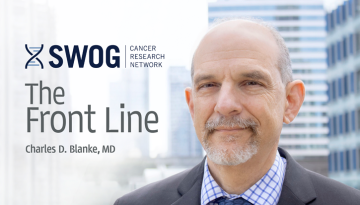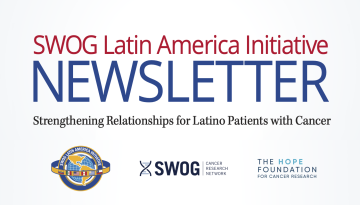S1929 at ASCO Shows Benefit in SLFN11+ SCLC
Among patients with extensive stage small-cell lung cancer (SCLC) that is positive for expression of the Schlafen-11 gene (SLFN11), those who received maintenance atezolizumab immunotherapy plus the PARP inhibitor talazoparib had significantly longer progression-free survival (PFS) times than those who received atezolizumab alone (median PFS 4.2 months versus 2.8 months).
These results from the phase II S1929 trial conducted by the SWOG Cancer Research Network, a clinical trials group funded by the National Cancer Institute (NCI), will be reported in an oral presentation at the 2023 meeting of the American Society for Clinical Oncology in Chicago on June 3 (Abstract #: 8504 -
June 3, 4:12 pm, Hall B1).
The work was led and will be presented by Nagla Abdel Karim, MD, a SWOG investigator who directs the Early Therapeutics Program at the Inova Schar Cancer Institute and the University of Virginia.
“The results of S1929 demonstrate improvement in progression-free survival in patients with SLFN11-expressing small-cell lung cancer,” Karim said. “This is a groundbreaking milestone in building future studies for small-cell lung cancer towards a personalized approach to therapy. Progression-free survival is of great clinical significance, especially in this aggressive disease.”
The S1929 study randomized 106 patients who received front-line chemotherapy with atezolizumab and whose tumors tested positive for SLFN11 expression. All randomized patients were included in the analysis. Progression-free survival was the primary endpoint in the trial. Patients on the talazoparib arm had a risk of disease progression or death that was reduced by 30 percent (PFS hazard ratio [80% CI]: 0.70 [0.52-0.94]; p=0.056) compared to that for patients on the atezolizumab-only arm.
Secondary endpoints included overall survival. Median overall survival times were similar between the two arms (9.4 months in the investigative arm versus 8.5 months in the control arm).
Patients on the combination therapy did experience significantly more hematological adverse events (blood-based side effects) than those on the atezolizumab-only therapy (50 percent versus 4 percent), although this increased rate of hematological toxicity was expected. Non-hematological adverse event rates were similar between the two arms (15 percent versus 13 percent, respectively).
The authors note that the S1929 study results also demonstrate, for the first time, the feasibility of conducting biomarker-selected trials in patients with SCLC, which could pave the way for future trials that evaluate new therapies for the disease in selected patient populations.
“Managing small-cell lung cancer based on predictive biomarkers is now seen as a possibility that will change clinical practice,” Karim said.
Study S1929 is supported by the NCI, part of the National Institutes of Health (NIH), led by SWOG, and conducted by the NIH-funded NCI National Clinical Trials Network (NCTN). Clinical trial registration number: NCT04334941.
S1929 was funded by the NIH/NCI through grants U10CA180888, U10CA180819, U10CA180820, U10CA180821, U01CA213273, R01CA207295, and P50CA070907, and in part through a grant from the NIH/NCI’s Biomarker, Imaging, & QOL Studies Funding Program (BIQSFP). Additional support was provided by Genentech, Inc., a member of the Roche Group; by Pfizer, Inc.; by the University of Texas MD Anderson Cancer Center Lung Cancer Moonshot Program; and by the Andrew Sabin Family Fellowship. Genentech, Inc., and Pfizer, Inc., provided atezolizumab and talazoparib, respectively, for S1929 through Cooperative Research and Development Agreements between NCI and each of the companies.
In addition to Karim, the S1929 study team included Jieling Miao, MS, SWOG Statistics and Data Management Center and Fred Hutchinson Cancer Center; Karen L. Reckamp, MD, Cedars-Sinai Medical Center; Carl Michael Gay, MD, PhD, University of Texas MD Anderson Cancer Center; Lauren Averett Byers, MD, University of Texas MD Anderson Cancer Center; Yingqi Zhao, PhD, , SWOG Statistics and Data Management Center and Fred Hutchinson Cancer Center; Mary Redman, SWOG Statistics and Data Management Center and Fred Hutchinson Cancer Center; Daniel R. Carrizosa, MD, MS, Carolinas Medical Center/Levine Cancer Institute; Wei-Lien Wang, MD, University of Texas MD Anderson Cancer Center; William J. Petty, MD, MS, Wake Forest School of Medicine; Kathan Mehta, MD, MPH, University of Kansas; Bryan A. Faller, MD, Heartland NCORP/Missouri Baptist Medical Center; Edem S. Agamah, MD, Southern Illinois University School of Medicine; Samer S. Kasbari, MD, MS, Southeast Clinical Oncology Research Consortium NCORP/Southeastern Medical Oncology Center-Goldsboro; Rajini Katipamula Malisetti, MD, Metro Minnesota Community Oncology Research Consortium/Mercy Hospital; Atul Kumar, MD, New Mexico Minority Underserved NCORP/ University of New Mexico Cancer Center; John Schallenkamp, MD, Montana Cancer Consortium NCORP/ Billings Clinic Cancer Center; Krishna Chaitanya Alluri, MD, Pacific Cancer Research Consortium NCORP/Saint Luke's Cancer Institute; Jhanelle E. Gray, MD, Moffitt Cancer Center; and Karen Kelly, MD, UC Davis Comprehensive Cancer Center.
Reference:
Abdel Karim N, Miao J, Reckamp K, Gay C, Byers L, Zhao Y, Redman M, Carrizosa D, Wang W, Petty W, Mehta K, Faller B, Agamah E, Kasbari S, Malisetti Rajini, Kumar A, Schallenkamp J, Alluri K, Gray J, Kelly K.
"SWOG S1929: Phase II Randomized Study of Maintenance Atezolizumab (A) Versus Atezolizumab + Talazoparib (AT) in Patients with SLFN11 Positive Extensive Stage Small Cell Lung Cancer (ES-SCLC)."
Abstract #: 8504
June 3, 4:12 pm, Hall B1 & Live Stream
Other Recent Stories



